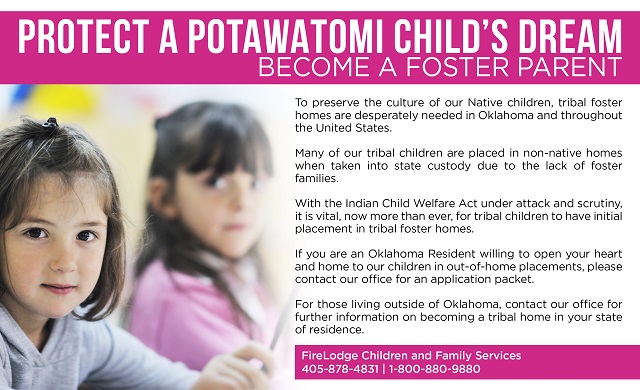
The Citizen Potawatomi Nation Indian Child Welfare Department knows first-hand that circumstances sometimes require a child be temporarily or permanently removed from a situation.
When the unthinkable happens, the CPN ICW staff looks to find the most caring and safe solution for these children. Currently, 33 CPN children from the area are in the custody of CPN’s Indian Child Welfare department. To ensure these children are placed into caring environments, ICW is in need of full-time tribal foster families in Pottawatomie County and the surrounding areas to provide homes for children who are no longer in the care of their parent.
When a child is taken into the custody of the CPN Tribal Court, ICW must find a safe, loving and nurturing home for them. Staff members of the department try to avoid placing these children in an emergency shelter; however, they have had to resort to that option when no tribal foster homes were available.
“Currently, all of our tribal custody children have foster home placements,” said Darla Courtney, ICW’s foster care and adoption specialist. “However, that situation can change at any moment. We have 15 homes that are approved as foster homes through CPN. At present, most of our foster homes are at full capacity and unable to take additional children.”
The need for local homes stems from the fact that the majority of the children in the custody of the court have frequent visitation with their parent or grandparent as well as other local appointments, including counseling and medical visits. Because the majority of services are local, it often presents a hardship for all involved when the children are placed in out-of-area foster homes.
“Our biggest need is additional foster homes in our local area. We need families willing to open their hearts and homes to provide full-time foster care, especially for older children and sibling groups,” Courtney said.
When siblings are taken into custody, the staff makes every effort to keep them together during such a difficult time. Without an adequate number of foster homes available, the siblings may have to be separated until another placement can be located.
The ultimate reason in recruiting additional foster homes is to ensure tribal children have a safe environment and stay connected to their tribal culture and heritage.
For those who would like to help these children but cannot commit to long-term care, ICW can utilize homes willing to provide short-term care. For example, foster homes may need someone to watch their foster children for short periods, such as for vacations or to tend to an illness in the family.
When a foster child is not able to return home, it is the responsibility of ICW to find a permanent home for the child. There is currently a waiting list of families wanting to adopt. Courtney explained that most families desiring to adopt understand the risk of becoming attached to a child while doing foster care and do not want to experience the heartbreak of a child leaving their home. However, many foster families often develop such a strong bond with the children in their home that if the child does become legally available for adoption, they may choose to adopt.
It is extremely rare for a child to come into ICW’s custody and be immediately available for adoption. The majority of children are in foster care for quite some time while their parents work through a treatment plan and toward reunification of their family. Should the parents fail to achieve reunification and have their rights terminated, then the children become available for adoption.
Individuals and families who are interested in fostering will receive a packet which includes the ICW Handbook for Placement Home, application and background check forms. A series of background checks for all adults living in the home will be performed and a visit will be scheduled.
Any individual or family wishing to become a foster home with CPN can contact the ICW department at (405) 878-4831.
